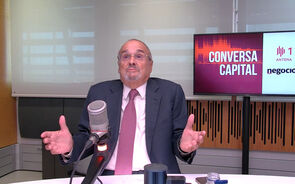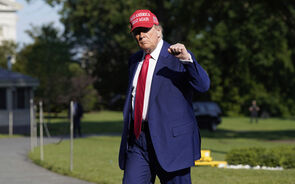e está a começar também a guerra comercial...
1 Mensagem
|Página 1 de 1
e está a começar também a guerra comercial...
Justamente o que mais se temia, está a começar !!
Todos a perder a cabeça, graças às restrições dos EUA. Agora, o Japão e a Noruega ameaçam retaliar o aumento das tarifas aduaneiras dos EUA.
Naturalmente, os mercados passaram para o vermelho. Isto não é ruído, isto é mau sentimnto.
dj
Nov. 21 (Bloomberg) -- Japan and Norway said they will impose duties on U.S. goods in retaliation for President George W. Bush's steel tariffs, adding to the risk of a global trade conflict the day after China threatened a response to American curbs on its textiles.
Japanese sanctions on U.S. imports worth $98 million add to a $2.2 billion retaliation list the European Union will impose on American products next month. Norway is planning a 30 percent tariff on U.S. products, and China may slap duties on U.S. goods in response to U.S. limits on $500 worth of textile imports.
``We need to keep the peace,'' World Trade Organization Director General Supachai Panitchpakdi said of China's threat during an interview in his office overlooking Lake Geneva. ``We need to try to contain it one way or another because this could escalate. There could be other countries involved.''
Bush's March 2002 decision to protect steelmakers such as Nucor Corp. and U.S. Steel Corp. and limits he announced Tuesday on Chinese textiles fueled concerns about growing protectionism as each measure sparked a response from the 15-nation EU, Japan, China and Norway. Global trade is worth $8 billion.
``It sure looks like it's all coming to a peak,'' said John Disharoon, head of public affairs at Caterpillar Inc.'s Brussels office. ``Just look at the amount of money going into China; it's essential for everybody that it doesn't get out of hand.''
WTO arbitrators ruled the U.S. steel tariffs illegal on Nov. 10, setting the stage for the EU to impose the largest trade sanctions in the organization's eight-year history and the first- ever against the U.S.
Currency Markets
Concerns about a trade conflict, which would undermine the global economic recovery by stalling investment and creating uncertainty about the cost of exports, are already reflected in currency markets. The dollar yesterday fell to its lowest level since the euro was introduced in 1999. The U.S. currency has declined against 14 of 16 major currencies this year.
China is the third-biggest international investor in U.S. Treasuries and may sell some of its holdings, the Royal Bank of Canada said in a report Wednesday. That same day, China delayed a soybean-buying trip to the U.S., triggering a plunge in soybean prices and the biggest drop in wheat futures in eight years.
The U.S. trade deficit with China reached a record $12.7 billion in September. More than 2.6 million manufacturing jobs have been lost since Bush took office, and groups such as the National Association of Manufacturers have placed some blame on what they call unfair trade practices by China.
Supachai urged China to negotiate, not hit back against the U.S. for restricting Chinese textiles and hurting companies such as Huinongsi Knitting Underwear Co. and Texwinca Holdings Ltd.
Japanese Tariffs
Japan today said it would retaliate against the U.S. safeguards with tariffs of about 30 percent on U.S. iron and steel products as early as this year. The world's second-largest economy will also raise duties on clothing, leather goods and other household goods by about 5 percentage points.
Added to that are EU sanctions that will apply next month on $2.2 billion of U.S. imports unless Bush removes the tariffs. Norway today said it would ``stand together with the EU and other countries being hurt'' by the safeguards when it announced duties on U.S. products including clothing, apples and guns.
Supachai said he supports U.K. Prime Minister Tony Blair's efforts to persuade Bush to drop the safeguards. Bush yesterday vowed to make a ``timely decision'' after reviewing the duties.
The U.S. is applying the terms of China's WTO membership in imposing the textile restrictions, Supachai said. Chinese retaliation may be more difficult to defend and China should turn to negotiation first, he said.
Justification
``We are all well advised to come to negotiation before we start with countermeasures,'' Supachai said. ``China would have to do something in an area where there may not be the same kind of justification to find a way to retaliate. Then the U.S. can again retaliate and bring the case to us -- that's escalation.''
U.S. Commerce Secretary Donald Evans says he is willing to negotiate with China over the restrictions. He said he wasn't concerned that the textile curbs may worsen trade tensions between the U.S. and China, which may have a record trade surplus of $130 billion with the U.S. this year.
The Bush administration is targeting knit fabrics, robes and brassieres because imports of these products from China surged after broader quotas were removed. More quotas of Chinese textiles such as dresses, underwear, T-shirts and jeans will be lifted on Jan. 1, 2005.
The dispute should be handled ``delicately'' as many nations, including the U.S., are bound to clash with China over trade policy in the future, Supachai said. A conciliatory response and negotiation ``would set a good precedent. But if this becomes a retaliatory process, then it might get out of hand,'' the former Thai deputy prime minister said.
Unprecedented Provision
As part of its accession agreement, China accepted an unprecedented provision that allowed the U.S. and other WTO member governments to impose caps unilaterally to prevent Chinese products from disrupting markets and hurting domestic industries.
The U.S. Commerce Department said it would limit growth for the textiles to 7.5 percent above the previous year's imports, as permitted under the provision.
Evans said yesterday in Miami that other U.S. industries shouldn't use the textile restrictions to make appeals for further trade protection.
``At the moment, this is a case that is early enough for us to address in a most peaceful manner,'' Supachai said, ``in anticipation of what is bound to come in the future.''
European Trade Commissioner Pascal Lamy said Wednesday he would watch to make sure the EU isn't flooded with Chinese textiles meant for U.S. consumers. A decision whether to protect EU markets will depend on ``a lot of number-crunching of the products which will be capped,'' Lamy said.
Todos a perder a cabeça, graças às restrições dos EUA. Agora, o Japão e a Noruega ameaçam retaliar o aumento das tarifas aduaneiras dos EUA.
Naturalmente, os mercados passaram para o vermelho. Isto não é ruído, isto é mau sentimnto.
dj
Nov. 21 (Bloomberg) -- Japan and Norway said they will impose duties on U.S. goods in retaliation for President George W. Bush's steel tariffs, adding to the risk of a global trade conflict the day after China threatened a response to American curbs on its textiles.
Japanese sanctions on U.S. imports worth $98 million add to a $2.2 billion retaliation list the European Union will impose on American products next month. Norway is planning a 30 percent tariff on U.S. products, and China may slap duties on U.S. goods in response to U.S. limits on $500 worth of textile imports.
``We need to keep the peace,'' World Trade Organization Director General Supachai Panitchpakdi said of China's threat during an interview in his office overlooking Lake Geneva. ``We need to try to contain it one way or another because this could escalate. There could be other countries involved.''
Bush's March 2002 decision to protect steelmakers such as Nucor Corp. and U.S. Steel Corp. and limits he announced Tuesday on Chinese textiles fueled concerns about growing protectionism as each measure sparked a response from the 15-nation EU, Japan, China and Norway. Global trade is worth $8 billion.
``It sure looks like it's all coming to a peak,'' said John Disharoon, head of public affairs at Caterpillar Inc.'s Brussels office. ``Just look at the amount of money going into China; it's essential for everybody that it doesn't get out of hand.''
WTO arbitrators ruled the U.S. steel tariffs illegal on Nov. 10, setting the stage for the EU to impose the largest trade sanctions in the organization's eight-year history and the first- ever against the U.S.
Currency Markets
Concerns about a trade conflict, which would undermine the global economic recovery by stalling investment and creating uncertainty about the cost of exports, are already reflected in currency markets. The dollar yesterday fell to its lowest level since the euro was introduced in 1999. The U.S. currency has declined against 14 of 16 major currencies this year.
China is the third-biggest international investor in U.S. Treasuries and may sell some of its holdings, the Royal Bank of Canada said in a report Wednesday. That same day, China delayed a soybean-buying trip to the U.S., triggering a plunge in soybean prices and the biggest drop in wheat futures in eight years.
The U.S. trade deficit with China reached a record $12.7 billion in September. More than 2.6 million manufacturing jobs have been lost since Bush took office, and groups such as the National Association of Manufacturers have placed some blame on what they call unfair trade practices by China.
Supachai urged China to negotiate, not hit back against the U.S. for restricting Chinese textiles and hurting companies such as Huinongsi Knitting Underwear Co. and Texwinca Holdings Ltd.
Japanese Tariffs
Japan today said it would retaliate against the U.S. safeguards with tariffs of about 30 percent on U.S. iron and steel products as early as this year. The world's second-largest economy will also raise duties on clothing, leather goods and other household goods by about 5 percentage points.
Added to that are EU sanctions that will apply next month on $2.2 billion of U.S. imports unless Bush removes the tariffs. Norway today said it would ``stand together with the EU and other countries being hurt'' by the safeguards when it announced duties on U.S. products including clothing, apples and guns.
Supachai said he supports U.K. Prime Minister Tony Blair's efforts to persuade Bush to drop the safeguards. Bush yesterday vowed to make a ``timely decision'' after reviewing the duties.
The U.S. is applying the terms of China's WTO membership in imposing the textile restrictions, Supachai said. Chinese retaliation may be more difficult to defend and China should turn to negotiation first, he said.
Justification
``We are all well advised to come to negotiation before we start with countermeasures,'' Supachai said. ``China would have to do something in an area where there may not be the same kind of justification to find a way to retaliate. Then the U.S. can again retaliate and bring the case to us -- that's escalation.''
U.S. Commerce Secretary Donald Evans says he is willing to negotiate with China over the restrictions. He said he wasn't concerned that the textile curbs may worsen trade tensions between the U.S. and China, which may have a record trade surplus of $130 billion with the U.S. this year.
The Bush administration is targeting knit fabrics, robes and brassieres because imports of these products from China surged after broader quotas were removed. More quotas of Chinese textiles such as dresses, underwear, T-shirts and jeans will be lifted on Jan. 1, 2005.
The dispute should be handled ``delicately'' as many nations, including the U.S., are bound to clash with China over trade policy in the future, Supachai said. A conciliatory response and negotiation ``would set a good precedent. But if this becomes a retaliatory process, then it might get out of hand,'' the former Thai deputy prime minister said.
Unprecedented Provision
As part of its accession agreement, China accepted an unprecedented provision that allowed the U.S. and other WTO member governments to impose caps unilaterally to prevent Chinese products from disrupting markets and hurting domestic industries.
The U.S. Commerce Department said it would limit growth for the textiles to 7.5 percent above the previous year's imports, as permitted under the provision.
Evans said yesterday in Miami that other U.S. industries shouldn't use the textile restrictions to make appeals for further trade protection.
``At the moment, this is a case that is early enough for us to address in a most peaceful manner,'' Supachai said, ``in anticipation of what is bound to come in the future.''
European Trade Commissioner Pascal Lamy said Wednesday he would watch to make sure the EU isn't flooded with Chinese textiles meant for U.S. consumers. A decision whether to protect EU markets will depend on ``a lot of number-crunching of the products which will be capped,'' Lamy said.
Cuidado com o que desejas pois todo o Universo pode se conjugar para a sua realização.
1 Mensagem
|Página 1 de 1
Quem está ligado:



